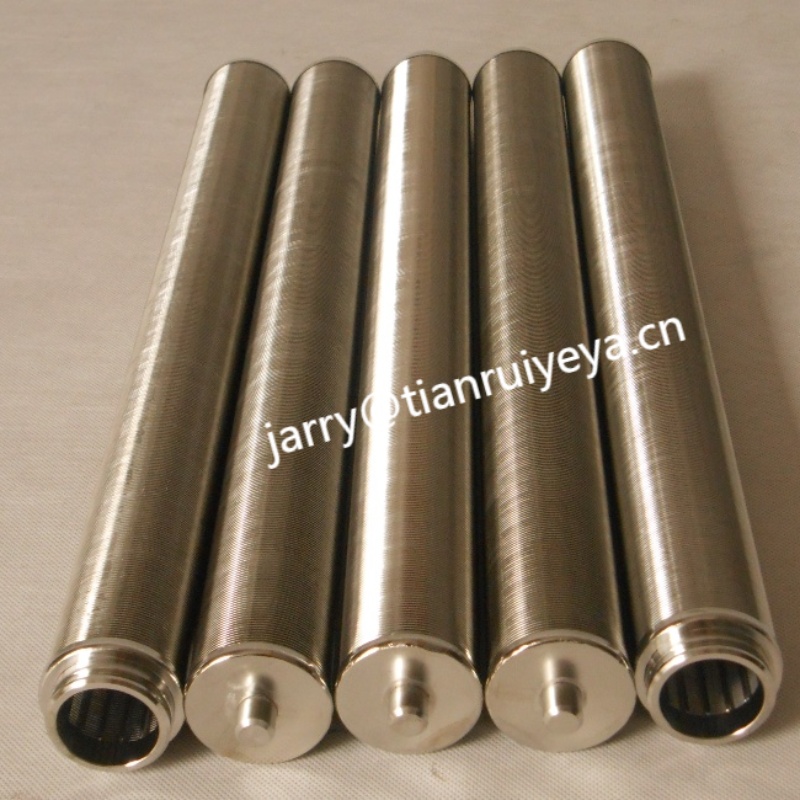If you want to learn about wedge wire filter elements and choose the style that suits you, then you definitely can’t miss this Blog!
In the world of industrial filtration, there’s a device that has become a staple in water treatment, oil and gas extraction, food processing, and more—thanks to its unique structure and robust performance. It’s the wedge wire filter. Unlike traditional mesh or sintered filters, this V-shaped wire-based filtration device is redefining industrial filtration standards with its durability, efficiency, and adaptability.
What Exactly Is a Wedge Wire Filter?
At its core, a wedge wire filter is a heavy-duty filtration device constructed by welding V-shaped wires (wedge wires) to support rods, creating a screen with precisely sized gaps. Its key design logic lies in the inclined angle of the V-shaped wires: this prevents particles from clogging the filter, ensuring stable operation even in high-pressure, high-wear environments.
Why It Outperforms Traditional Filters
Compared to common mesh or sintered filters, wedge wire filters offer significant advantages:
- Exceptional Longevity: In corrosive or high-wear environments, their lifespan can reach 20 years—several times that of standard mesh filters.
- Superior Self-Cleaning: The smooth surface of wedge wires allows debris to be easily removed via backwashing or mechanical cleaning, reducing maintenance needs by 30%-50%.
- Extreme Environment Resistance: They withstand temperatures up to 900°F (≈482°C), far exceeding sintered filters (600°F) and mesh filters (400°F). They also handle pressures over 1000 psi, making them ideal for oil and gas, high-temperature chemical processes, and more.
- Higher Flow Efficiency: Their open surface area design delivers 40%+ higher flow rates in water treatment compared to mesh filters, avoiding system inefficiencies from clogging.
Industries That Can’t Do Without It
- Water Treatment & Environmental Protection: From municipal water intake filtration to wastewater backwash systems, even seawater desalination pretreatment—they reliably remove suspended solids.
- Oil, Gas & Mining: Separating sand in crude oil extraction, filtering high-viscosity slurries in mining, and resisting abrasion from sand and chemical corrosion.
- Food & Pharmaceutical: Used in starch extraction, juice clarification, etc. Stainless steel variants meet food-grade standards, with easy cleaning and no residue.
- Chemical & Energy: Withstanding acid and alkali corrosion and extreme temperatures in catalyst recovery and high-temperature cracking, ensuring process continuity.
How to Choose the Right Wedge Wire Filter
Selection hinges on three core needs:
- Application Fit: Wide gaps for high-viscosity fluids; wear-resistant materials (e.g., 316 stainless steel, Hastelloy) for abrasive slurries.
- Precise Sizing: Inner diameter (50-600mm), length (500-3000mm) must match equipment space; gap width (0.02-3mm) depends on target filtration precision.
- Custom Details: Non-circular shapes (rectangular, hexagonal), special connections (threaded, flanged), or reinforced rod designs enhance compatibility in complex systems.
Maintenance Tips
To maximize your wedge wire filter’s lifespan:
- Regularly backwash with high-pressure water or air; use mild acid/alkali solutions for stubborn deposits.
- Avoid scraping the surface with hard tools to prevent wire deformation.
- In corrosive environments, opt for 316 stainless steel or titanium, and inspect weld integrity periodically.
Like well-known brands such as ANDRITZ Euroslot, Costacurta, Aqseptence Group, and Filson—whose wedge wire filter elements are sold worldwide—Xinxiang Tianrui Hydraulic Equipment Co., Ltd. also designs and manufactures a wide range of wedge wire filter elements for global markets. Our main customers are primarily from Europe, America, and East Asia, accounting for 80% of our exports.
Post time: Sep-10-2025

